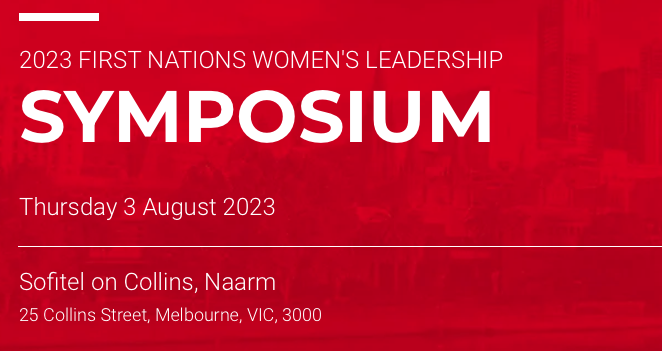
Event addresses the gap facing First Nations women
Women & Leadership Australia has partnered with Women’s Business for the 2023 First Nations Women’s Leadership Symposium which will take place in Naarm/Melbourne on Thursday 3 August at the Sofitel on Collins.
The one-day event will celebrate Aboriginal and Torres Strait Islander women Ieaders across Australian business and communities and will encourage culturally safe leadership development through an inspiring panel discussion and keynote speeches from a variety of high-level First Nations leaders.
Women & Leadership Australia CEO, Karen Taylor said: “The 2023 First Nations Women’s Leadership Symposium is an important forum for connecting First Nations women leaders in a safe space. Advancing the rights, health, safety, and wellbeing of First Nations women and girls is vital to closing the gap for Aboriginal and Torres Strait Islander people across Australia. It is a privilege to be able to work with Women’s Business to engage these women and hear firsthand the challenges they face and workshop solutions to ensure future generations can approach the workforce and leadership roles with confidence, safety and equal opportunity.”
According to Gari Yala: Speak the Truth – Gendered Insights report, Aboriginal and Torres Strait Islander women are underrepresented in the Australian Workforce with substantially lower rates of workforce participation (51.5%) compared to Aboriginal and Torres Strait Islander men (65%) and non-Aboriginal and Torres Strait Islander women (59.2%). The Gari Yala survey found that Indigenous women in culturally unsafe workplaces were over 10 times more likely to be often or very often treated unfairly at work than those working in culturally safe businesses; and around 20 times more likely to hear racial or ethnic slurs.
Led by the Australian Government’s Workplace Gender Equality Agency, the report also highlighted the need for managers to create safe workplaces for Aboriginal and Torres Strait Islander workers. It concluded that organisations who prioritised inclusion and diversity for its Indigenous employees experienced smaller staff turnover and higher rates of employee satisfaction.
First Nations people in New South Wales are less likely to be small business owners compared to non-Indigenous people, with First Nations women more likely to experience barriers in accessing capital to start and grow businesses than non-Indigenous businesses. And shockingly, Indigenous females are 35 times as likely as non-Indigenous females to be hospitalised for assault.
Women’s Business Founding Director Kat Henaway said: “It’s a distressing truth that First Nations women continue to be among the most marginalised demographic in Australia. We are proud to be working in close partnership with Women & Leadership Australia to deliver a meaningful opportunity for First Nations women to develop their leadership capacity and connections via their impressive network of women. As Australia prepares for The Voice to Parliament Referendum, bringing together passionate and inspirational First Nations women leaders is timely.”

